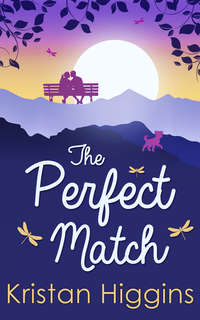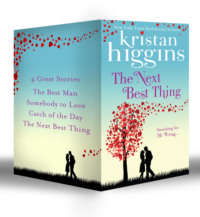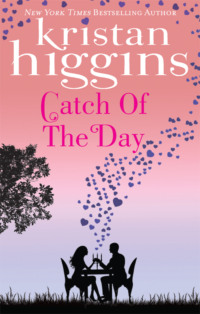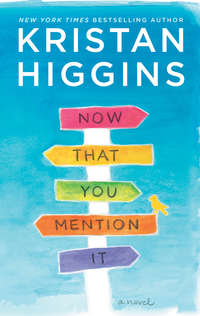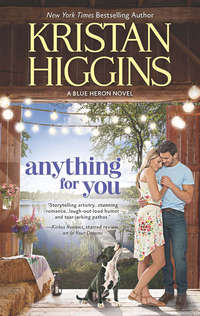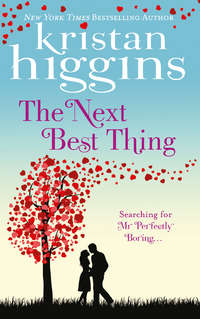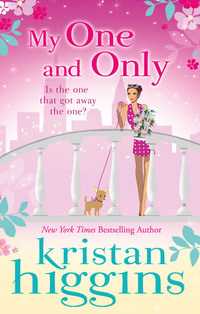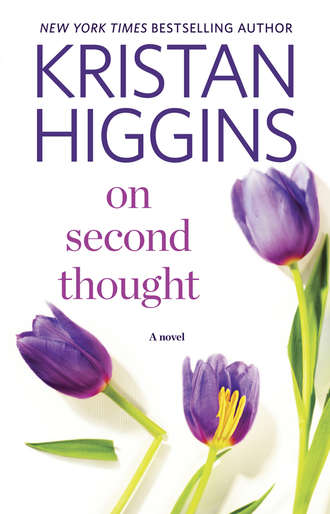
Полная версия
On Second Thought
The antenna quivered. Why would he wait all day to tell me this? “Where’d you take her?” I asked.
“Huh? Oh, someone helped her to the hospital. She was fine.”
The antenna twitched.
“Did you get her name? It would make a fantastic piece.”
“I should’ve asked, right? Guess I was just too caught up in the moment.” Except he was a newsman. Getting the story was his life.
The antenna began voguing, Madonna-style.
I took a bite of my sesame noodles. “It’s funny. Sometimes it seems like you only remember the best details after you’ve had a couple hours.” I didn’t look at him as I spoke, and I kept my tone careful.
This was my boss. He made sixteen million dollars a year. He’d given me an incredible career, and I wasn’t exactly awash in life skills.
Ryan didn’t answer. Just looked at me and took another bite of his Reuben.
“I just want to be sure the story is...clean,” I said.
“Of course it is, Ainsley,” he said with that crooked grin America loved. “Sometimes it takes a little while for everything to filter through. The adrenaline, you know? Well.” There was a significant pause. “Maybe you don’t. Since you don’t go on scene.”
In other words, don’t push it.
Every news show probably did the same thing, right? I mean, it didn’t simply rain anymore—we had rain events. Fog warnings. Anchors were sent to stand in front of empty buildings in the middle of the night to create a sense of drama. “Earlier today, a shocking story...”
Really, what did I know? I wasn’t there. My antenna knew nothing.
Then came the point of no return.
It shouldn’t have been such a big deal. Really, of all of Ryan’s exaggerations to cause a frenzy, this one was the most harmless. But the frenzy happened just the same.
Ryan was doing a story on the cuts Congress had just made to veteran benefits. He was interviewing a vet who’d lost both her legs and part of her face to an IED. They all sat in the humble living room, the husband’s voice gruff as he spoke about his wife’s courage and determination, the American flag in its triangle box on a shelf behind them.
Ryan looked so gentle and concerned that I myself teared up. He asked about what the benefit cuts would mean to the family, how much her physical therapy (no longer covered) had helped, and what her prosthetics and additional plastic surgery would cost.
Then the kicker. The couple’s three-year-old wandered into the shot and climbed right on Ryan’s lap. “Hello, there, sweetheart,” he said, and he carried on the interview just like that. She fell asleep with her head on his shoulder.
You could feel America sigh with love.
I mean, talk about good TV! The noble warrior, her hardworking husband, their adorable toddler and America’s most trusted face. You couldn’t script that stuff.
Except apparently, you could.
Two weeks later, the New York Post ran the headline: Ryan Roberts Bribes Military Family for America’s Tears. An email had been leaked—the veteran’s husband wrote to thank Ryan for doing the story and apologized that it took so long for Callie to warm up to you. Hope your ears don’t still hurt from her crying!
Crying? There’d been no crying!
The email went on. The extra money sure will help. We really appreciate it.
Ryan could not be reached for comment.
Turned out, he’d offered the couple a thousand dollars to have their kid come sit on his lap, coached into the shot by the grandmother. It had taken quite a few tries before little Callie trusted Ryan.
Bill, the retirement-age cameraman, had leaked it. Though he’d been in on Ryan’s exaggerations all along (for a few extra thousand each time), this story was the straw that broke his back. He was a veteran himself. The couple admitted they simply needed the money for better prosthetics, due to the Congressional funding cuts.
Long story short, Congress got off their asses as if they were on fire.
A GoFundMe page was set up for the family, and more than $1.4 million was raised in the first day.
Ryan’s other stories came to light. The tornado. The bullets. The drowning woman in the subway. He was fired, and after a six-month period of head-hanging and sheepish apologies, he was rehired at another network for a paltry half of his sixteen-million-dollar salary.
I was fired, too. I was not rehired. It was my job to make sure the news was clean, to know if Ryan was stretching the truth, to keep an eye on these things, goddamn it! as the head of NBC screeched.
So I joined the ranks of the unemployed, as appealing to other networks as an Ebola-riddled leper holding an open jar of typhus.
After my one hundred and fiftieth job rejection in four weeks (Starbucks wouldn’t have me), I lay on the couch, ten pounds heavier than I’d been a month ago. It was okay, I told myself between bouts of sobbing and Ben & Jerry’s. I never wanted to be a producer in the first place. At least I had Eric. And Ben. And Jerry.
Eric sighed as he came in; I was in the “pajama” phase of grief. “Babe, come on. You were gonna leave anyway once we had kids.”
“It’s just... I didn’t do anything wrong. Technically.”
“I know. We’ve been over this.”
Oh, God. If Eric didn’t want to talk about it—Eric my rock, my love, my best friend—I was really, really pathetic.
Then he threw me the best bone ever. “Listen, with my salary, you don’t need to work. Take your time, find something you really love, something that will work in the next phase of our lives. Besides...” He paused and stroked my unclean hair. “Don’t you think it’s time we bought a house?”
Hell’s to the yes! It was exactly what I needed. I’d figure out what the next phase was (marriage and children, thank you very much). First step, a home for all of us.
We found a house in Cambry-on-Hudson, where I’d spent my teenage years, where Candy and Dad still lived, forty-five minutes from Judy and Aaron in Greenwich. An easy commute for Eric via the train, close enough to the city that we could still pop in for a show or to see friends, far enough away that it felt like the country. The posh little town was filled with interesting shops, some great restaurants, a couple of little galleries and a bakery that could be compared only with paradise. A marina jutted out into the Hudson, and high on a hill sat a huge white country club that we nicknamed Downton Abbey (which would be perfect for our wedding).
“Wait till we have kids,” Eric warned me when we found the house. “Don’t be surprised if my parents buy the house next door.” That would be great with me.
Our house was a little soulless from the outside, but fabulous on the inside. Huge bedrooms, a sunken living room, a kitchen with granite countertops and a nice front porch. It was in a development, which I hadn’t wanted, but the yard was landscaped and pretty.
We went to the animal shelter and picked out Ollie, then a skinny little bag of bones who’d been found tied to a phone pole. Still, when we reached out to pet him, he wagged so hard he fell down.
“Our family has begun,” Eric said, kissing the dog on the head.
When it came time to sign the papers, I had a little shock.
“Um...my name isn’t on here,” I told the real estate agent.
“Oh, no! Did I make a mistake?” he asked. “I can draw up new papers. I just... I’m sorry, it must’ve been a misunderstanding.”
“No, let’s do this,” Eric said. “We can fix it later, babe.” He signed with a flourish, grinning at me, and when the Realtor left, we made love in the empty living room. His parents came over that night, and even though we drank champagne and laughed, I kept thinking about that. Eric Fisher. Not Eric Fisher and Ainsley O’Leary.
“I wonder if we’ll ever have grandchildren, Aaron,” Judy said, subtle as a charging lion. She held Ollie, stroking him as he crooned with joy. “Grand-dogs are lovely, too, but...”
“Mom,” Eric said. “Why do you think there are four bedrooms?”
He kissed me, and Judy sighed, and Aaron chuckled, and I put my worries aside and waited for a marriage proposal. Kept waiting. Waited some more. Started volunteering at the local senior housing complex where Gram-Gram lived, bringing Ollie in for pet therapy. Planted tulip bulbs. Painted rooms, refurbished a table, bought furniture.
Two months after we moved, Eric got another promotion. He apologized, saying he really, really wanted to tie the knot and spend more time at home but this job would put us over the top. I tried not to feel glum. His career was on fire; I was an anomaly in Cambry-on-Hudson—a stay-at-home person. Like a shut-in, Kate mused, or a kept woman. She smiled when she said it, but I knew she meant it.
I missed my old job more than I ever would’ve guessed.
That was when Candy got me an interview for features editor at Hudson Lifestyle. “Don’t mess this up,” she said over the phone as I stood in front of the fridge, eating Ben & Jerry’s Chunky Monkey, Eric in Dallas yet again.
“Thanks for your faith in me, Candy,” I said. “I’ll try not to blow it.”
“It’s just that I have a professional reputation there. I recommended you for this job. If you don’t make a good impression, it will reflect badly on me, and let me tell you, I worked very hard to get where I am. It wasn’t easy, especially having a toddler thrust on me when I was forty years old.”
Lest we forget. “Got it, Candy. And really, thank you.” I hung up and polished off the entire pint of ice cream like any good American.
The offices of Hudson Lifestyle were in a brick building in the old part of downtown. There were six people on the staff, most in cubicles, most dealing with advertising and bookkeeping.
A secret about print journalism—the writers are often the least valued people on the job. Advertisers keep any paper afloat, and the graphics people have to set the thing up, and someone makes those irritating calls to see if you want to subscribe, and someone has to empty the trash and clean the bathrooms, but writers? Pah. A dime a dozen. There’s always some college intern who can do what you do. Besides, everyone reads only the Huffington Post and BuzzFeed.
I waited in the reception area, which was small but nicely furnished. The glossy magazine was spread out on the coffee table—a picture of a farmhouse on one cover; a head of lettuce on another; a sailboat on another. Headlines such as Best Plastic Surgeons in Westchester! and Farm to Table Dining and Area’s Top Garden Centers! told me all I needed to know about the magazine, which I’d never read before. The receptionist told me to have a seat, then disappeared (probably to clean the bathrooms and empty the trash).
I missed my old job. I missed Rockefeller Center. I missed Ryan. I missed being important.
Tears filled my eyes, and my nose prickled. Did I have a tissue? No, I did not. It’s just that this job...after my other job...it was such a step down. It was humiliating. I’d produced news stories on rebels in Afghanistan. I’d met the leader of the free world. Now I’d have to write about lettuce. I wiped my eyes on my sleeve, leaving a smear of eyeliner and mascara. Great.
A man came out to greet me, already seeming pissed off, as if he could read my mind. “Ashley?” he said.
“Ainsley. Ainsley O’Leary. A pleasure.” I stood up and stuck out my hand, which he looked at and didn’t shake.
“Are you crying?”
“Oh... I just... I’m a little, uh, premenstrual.” Shit.
He gave me a long, unblinking look. Strange, pale blue eyes, like an alien. “Will that be a problem during this interview?” he asked.
“Let’s hope not. But those first two days can be murder.” I smiled. He did not. I felt my uterus shriveling, as if his disapproving gaze was bringing on menopause.
Finally, he blinked. “I’m Jonathan Kent. This way.” I followed him into a big, sunny room divided into cubicles. One of the men gave me a half smile and, unless I was wrong, an eye roll.
“You have an appointment at eleven, Mr. Kent,” the receptionist said.
Mr. Kent, huh? He couldn’t be past forty, but he sure didn’t give off that easygoing Mark Zuckerberg vibe.
There was only one office on the floor—his. It was scary-neat, a clean desk (sign of a sick mind), one photo facing him. On the wall, a painting of, you guessed it, the Hudson River. A bookcase that contained books only, no statues, no photos, nothing personal at all.
“Remind me why you’re here,” he said, sitting behind the desk. “You want an internship, your mother says?”
“No, and she’s my stepmother. Not my mother. Candy, that is. Um, you’re looking for a features editor?”
Another long, pained, uterus-shriveling glance. “How old are you?”
“I believe it’s against the law to ask that question.” He stared. “Thirty,” I added.
“You look younger.” It wasn’t a compliment.
He stared at my résumé, glanced up at me. I smiled, or continued to smile, as the case was. He didn’t smile back. Looked at the papers again. My smile felt stiff. The left corner of my mouth was twitching.
People usually liked me right away.
Jonathan Kent wore a suit, and his tie was not loosened. He was clean-shaven, which was kind of rare these days. Dark hair combed back severely. Cheekbones like dorsal fins, and those pale eyes. He was neither attractive nor ugly. Generic Caucasian male with potential to be a serial killer, please. Back when I was the receptionist at NBC, I’d made calls for the casting director.
“Do you really want to work here?” he asked, looking up at me.
“Yes! I’m here for an interview, after all.”
He blinked. Finally. “Why?”
Because I’m bored didn’t seem like a great answer, though it would be honest. “Well, I really, uh, respect what you do and think I could positively contribute to the content of the magazine.” Ta-da! The perfect answer.
“What do we do?” he asked.
“Excuse me?”
“What is it you think we do?”
“Is that a trick question?” No answer. “You publish a regional magazine.”
“And why would we do that?”
Because it’s a cash cow. “To showcase the beauty and vibrancy of life in the Hudson River Valley,” I said with my best Girl Scout smile.
“Your résumé says you graduated from Wagner College. I assume you have a degree in journalism?”
“Uh, no.”
“English?”
“Nope.”
“Do I have to keep guessing, Ms. O’Leary?”
I winced, then smiled to cover. “Philosophy.” Another stare. “It’s one of those degrees that can be used for anything,” I said, echoing the duplicitous guidance counselor at Wagner.
“Is it?” Mr. Kent said. I couldn’t argue that point. “You worked for Ryan Roberts.” He waited, expressionless.
“Yes.”
“Who was fired for an egregious breach of professional ethics.”
“And rehired by another network. But yes. That’s correct.”
“Putting aside your possible complicity in his journalistic deception, do you have any actual skills or education to recommend you?”
I felt a sudden rush of anger. What a rude man. Ryan had not been my fault. (Okay, fine, a little bit my fault, but mostly not.)
“Wow, Jonathan,” I said. “Those are a lot of big words. I’m not sure I follow you.” Clearly, I wasn’t going to get the job, so why not go for broke? “But after seven years with NBC, I think I can write about the great lettuces of Westchester County and who does the best boob jobs.”
His expression didn’t change.
“Have a lovely day,” I said, standing up and reaching for the door.
“You’re hired,” he said. “You’ll have a three-month probationary period. Be here tomorrow. We open at 8:30. Don’t be late, Ms. O’Leary.”
And so I went from writing news that tens of millions of people would hear to editing fluff pieces—the historic Groundhog Day parade in Smithville and the artisan potter who’d had a piece bought by the White House. Where the prettiest wedding venues were (okay, that piece I enjoyed), and how shipping lanes had changed on the Hudson.
It was fine. It was pleasant. I made friends fast, as I always did, though Jonathan failed to succumb to my charms and didn’t eat the cookies I occasionally brought in. I was just killing time, waiting for Eric to propose so we could get married and have kids.
Instead, he got cancer.
Chapter Eight
Kate
My brother and his family stayed with me for three days after Nathan died, and thank God for it. Dad was helpless and overly jocular because of it. And Mom...though she didn’t say the words, there was definitely a grim sense of I told you not to get married so fast.
It was good to have the kids there, the two teenagers making heroic efforts to talk about movies or books or school. Kiara was lovely and kind, telling me nondeath stories about the hospital. I was invited to stay with them in the city. Esther said she’d give up her bed for me. Matthias told me he’d take me out for sushi.
Sean didn’t say much. There wasn’t much to say, of course. But part of me wanted him to come up with something for me to grab on to; he was my older brother, after all, always with that slight air of superiority granted to him by being the firstborn and only son.
He had nothing other than an occasional shoulder squeeze.
Ainsley, on the other hand, had been strangely practical, dividing up the food people brought into single-serving blocks, wrapping them in foil and labeling them, leaving a few in the fridge, most in the freezer. She and Eric had come for dinner last night, along with our parents, and I saw her and Eric dragging the trash cans down to the curb. Yesterday, when Sean and I went to the lawyer’s and Kiara was out with the kids, Ainsley came in and cleaned up the kitchen from our breakfast mess. She left a sweet note and a mason jar full of tulips on the kitchen table.
Sadie, the three-year-old, was the one I really wanted to be around. She didn’t really know or remember Nathan, only that “Auntie was sad” and thus appointed herself to be my keeper. Every morning they were here, my little niece climbed into my bed and ordered me to make animal sounds. Happy to oblige, I nuzzled her soft, fuzzy curls, pulling her close against me. “Kitty!” she demanded.
“Mew! Mew!”
“Gog!”
“Woof, woof!”
“Effalent!”
I took that to mean elephant and trumpeted obligingly.
“Wacoon!”
“Purr, purr.”
Her laughter sounded like water over rocks, and for a second, I’d thought that if she stayed, I could totally handle widowhood. Surely Sean and Kiara would give her to me. They had two other kids, the selfish things.
Alas, they were rather attached.
When they left on Wednesday, Kiara and Sean hugged me, and the kids tried to smile, and I tried not to cling too hard as my brother took Sadie out of my arms.
Then they pulled out of the stone driveway, leaving me alone in Nathan’s house.
A storm of panic started flinging debris in my head. What would I do? Could this really be my new life? Was it possible to rewind and skip Eric’s party? Or maybe...rewind and just say no when Nathan called for that first date? How could Nathan be dead? What was I supposed to do? Actually do in the next few hours?
I didn’t know.
I had no idea how to be a widow. I wanted to be brave. To make Nathan proud of me. To be elegant and kind. I could see myself in Paris, wearing a black Audrey Hepburn–style turtleneck, a glass of red wine in my hand as I stared out at the street, melancholy but noble. Perhaps I would take up smoking, just one a day, for effect. Men would look at me, intrigued, but that slight air of sorrow would keep them at arm’s length. I’d walk back to my garret, where I would continue to work on my...uh...my poetry, let’s say, and not the more realistic scenario of ripping open a bag of Cheetos and watching HBO.
I shivered. It was cooler than normal, and rainy.
I guess I had to go inside, into that enormous, empty house.
Okay. First step. A shower, probably. And then groceries. People had been bringing food over, lots and lots of food, but I hadn’t left the house since the cemetery. I needed half-and-half, which Matthias had mistaken for milk this morning and finished off. I couldn’t face the morning without coffee back when I was happy, let alone now. Ainsley would be happy to get it for me, I was sure, but I had to leave the house sometime and do something normal.
Nathan’s bathrobe was still on the hook on the back of the bathroom door. I didn’t touch it, afraid that something inside me would break. His toothbrush was still in the shower. I hated that he brushed his teeth in there, for some reason. It struck me as wrong, spitting at your own feet. So far, I hadn’t said anything.
I caught myself. So far. I wouldn’t have the chance to say anything, ever. Nathan’s legacy of spitting in the shower would last forevermore.
“No, no, that’s good,” I told myself. “He wasn’t perfect.” Yes! Remember his flaws. He spit in the shower! I’d never have to put up with that anymore! Score one for widowhood!
My chest hurt so much it was hard to take a full breath. I almost wished it was a heart attack. Then I could go to the hospital and get taken care of. Maybe they’d put me in a medically induced coma, and when I woke up, everything would be okay again. Maybe Nathan would be by my bedside. Or maybe I’d die and see him in heaven, the heaven I couldn’t quite picture.
I showered fast, threw on some yoga pants and a sweatshirt. Dared not look in Nathan’s closet, where all his beautiful clothes were. He had a thing for cashmere sweaters. Probably had twenty of them, and if I saw one now, I’d crumple.
I went downstairs, couldn’t find my phone and went into the den (or study). There it was, right in front of Hector’s bowl. “I’m leaving,” I said to my fish, who mouthed obligingly. “Need anything? Tampons? Got it.”
Speaking of tampons, I still didn’t have my period. Probably, I was pregnant. Screw those tests that said I wasn’t. It was just too soon to show up, that’s all.
I got in the car—a battered Volkswagen Golf that was good for holding all my photography gear. It had more than a hundred thousand miles on it, and Nathan and I had discussed getting another car, one with four-wheel drive, big enough for car seats and diaper bags. He’d blushed, and that awkwardness wriggled again—kids with a guy I hadn’t known for even a year.
That conversation had taken place just a few weeks ago.
I realized I was gripping the steering wheel, my knuckles white.
“Turn on the radio, Kate,” I said aloud. I hadn’t slept much lately, and my brain was fuzzy. I started the car, backed carefully out of the driveway, still worried that I’d take down the mailbox, then headed out. On the radio, a man-child scatted and falsettoed about being dumped. “Maybe if your testicles dropped, she would’ve stayed,” I said, then laughed. Hey, look at me! Laughing! See? All was not lost.
I rolled down the windows, the smell of rain and soil hitting me. Spring was here, wedding season. I was booked almost every Saturday from May through August. Maybe going to weddings wasn’t a smart idea. Would I cry? Would I run out, sobbing? Or would I just do what I’d been doing for the past fifteen years?
Oh, goody, a song I liked! “Lose Yourself” by Eminem. Good, good. Very inspirational, seize the moment, step into your power, all that Oprah-speak, but with cussing.
At a stoplight, I found that I was singing the bass line—“Whump whump whump whump bump bump bump bump. You better lose yourself—” And that was where I didn’t know the lyrics but kept singing anyway. You go, Eminem, foul-mouthed genius from the bad side of town! Yeah! “You only get one shot something something something yo!”
My eye caught the car next to me. The driver gave me a nod. I smiled and kept singing. Maybe she liked Eminem, too. She didn’t smile back.
Ah, shit. It was Madeleine, Nathan’s first wife.
Here I was, pretending to be a skinny white rapper, and she looked like...well, like someone had died.




